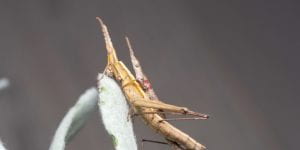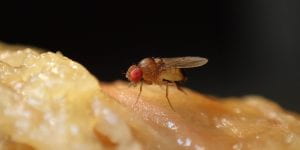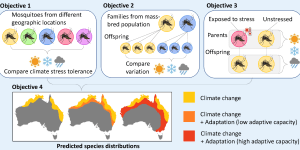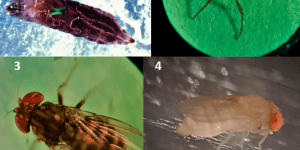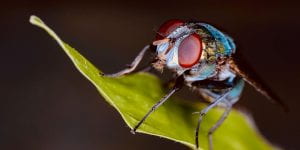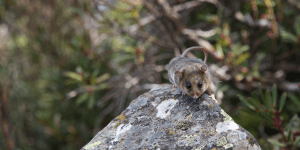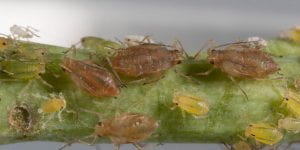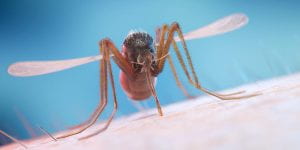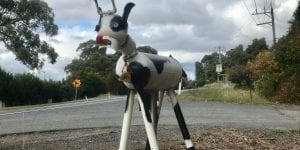Tag: evolution
-
The wingless grasshopper that could cross Bass Strait, but not the Yarra River
Hiromi Yagui, Michael Kearney & Ary Hoffmann Most grasshoppers can fly and some, notably locusts, can travel thousands of kilometres. However, there is a whole family of grasshoppers in Australia that can’t fly at all, and they are not very good at hopping either. These are the morabine (or ‘matchstick’) grasshoppers, comprising around 240 species […] -
The fly DNA fighting killer bacteria
Dr Perran Stott-Ross and Professor Ary Hoffmann Artwork by Tank Monsternova https://www.monsternova.art/ This article was first published on Pursuit. Read the original article. The more we learn about the biological world, the more complex it becomes. Nowhere is this more apparent than in recent discoveries about the ways in which microorganisms influence their hosts. The […]blogs.unimelb.edu.au/pearg/2023/03/29/the-fly-dna-fighting-killer-bacteria
-
New DECRA projects coming soon! 1/2
Predicting the future threat of mosquitoes under climate change – Perran Stott-Ross Mosquitoes are major global pests, transmitting harmful pathogens to humans and livestock and causing significant nuisance biting. Climate change will lead to unprecedented temperature increases in Australia, shifting the habitats that are suitable for mosquitoes. Insects are capable of rapid evolution, but we […]blogs.unimelb.edu.au/pearg/2022/09/27/new-decra-projects-coming-soon-1-2
-
The Scaptodrosophila, an Australian drosophilid genus
Ann J. Stocker Scaptodrosophila are a diverse group of flies whose appearance is very similar to the widespread and widely studied Drosophila. The genus is estimated to have diverged within the drosophilid lineage during the Cretaceous period about 70 million years ago. It was originally considered a subgenus of Drosophila and called Pholadoris in earlier […]blogs.unimelb.edu.au/pearg/2022/05/09/the-scaptodrosophila-an-australian-drosophilid-genus
-
Fly infertility shows we’re underestimating how badly climate change harms animals
Belinda van Heerwaarden, The University of Melbourne and Ary Hoffmann, The University of Melbourne Evidence of declining fertility in humans and wildlife is growing. While chemicals in our environment have been identified as a major cause, our new research shows there’s another looming threat to animal fertility: climate change. We know animals can die when […] -
Variety is the spice of life… and key to saving wildlife
“This article was first published on Pursuit. Read the original article.” Dr Andrew Weeks and Professor Ary Hoffmann In the critical battle against extinction, conservationists use a variety of tactics to try to save species. One of the most fundamental tools is maintaining the amount of variation of genetic material (DNA) in a group of […]blogs.unimelb.edu.au/pearg/2021/06/10/variety-is-the-spice-of-life-and-key-to-saving-wildlife
-
Male fertility ‘precariously close’ to climate change extinction limits
The loss of fertility in males as a result of climate change, particularly in the tropics, may be a better predictor of vulnerability to extinction by Dr Belinda van Heerwaarden This article was first published on Pursuit. Read the original article As temperatures rise across the globe, species will increasingly face environmental conditions beyond their […] -
Targeting the bacteria inside insects for improved pest management
This article was first published on Pursuit. Read the original article Francesca Noakes and Professor Ary Hoffmann Any home gardener knows of the long-running battle against insect pests. The little critters that sneak into your garden beds and strip leaves are irritating among prized kale, but for farmers these tiny pests can have devastating economic […] -
Tracking the movement of mosquito stowaways
This article was first published on Pursuit. Read the original article Dr Tom Schmidt Everyone knows mosquitoes can fly. Not everyone knows they fly in pressurised cabins 10,000 metres above the ocean. In fact, many of the most dangerous mosquito species get flown all over the world in aeroplanes, or travel on boats or other […]blogs.unimelb.edu.au/pearg/2020/08/05/tracking-the-movement-of-mosquito-stowaways
-
What can cattle teach us about evolution?
Ary Hoffmann Charles Darwin in his On the Origin of Species used data from domestic animals to argue for the power of natural selection in changing phenotypes. These included examples from birds and dogs as well as livestock. The latter having been selected across many years to increase productive yields such as milk and meat. […]blogs.unimelb.edu.au/pearg/2020/04/17/what-can-cattle-teach-us-about-evolution
Number of posts found: 23
